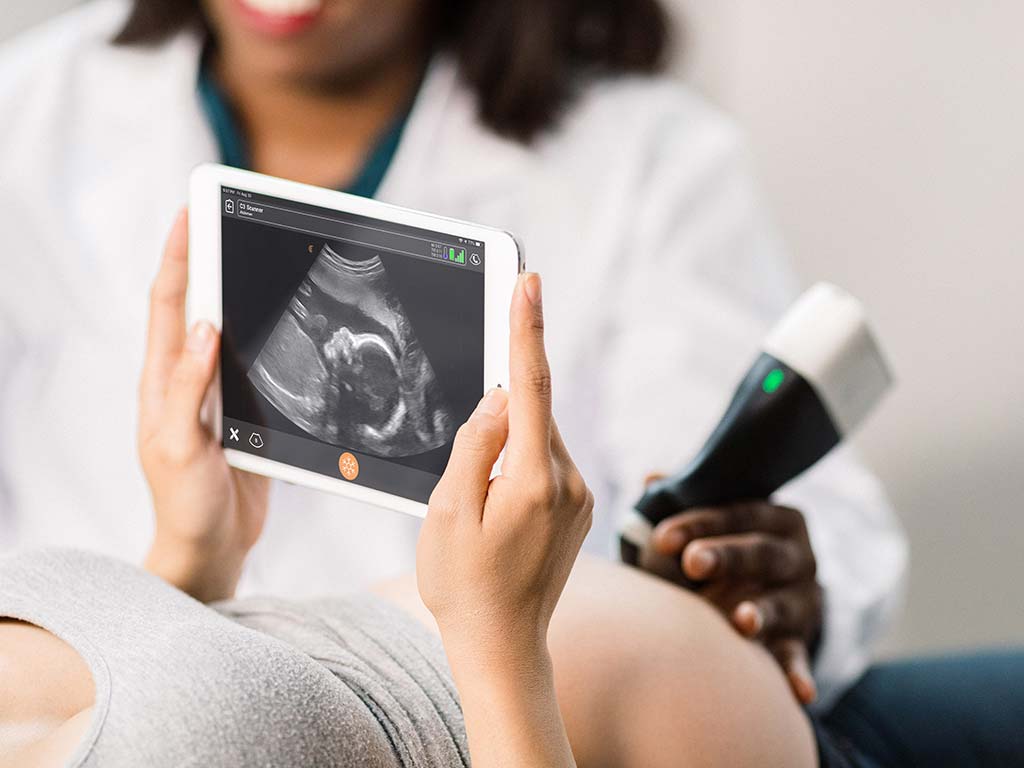
Intelligent Network for Point-of-Care Ultrasound
Using technology to deliver equal access to life-saving ultrasound imaging.
Project Overview
Updated March 31, 2023.
The Problem
Ultrasound is a key clinical tool in the healthcare system. It helps provide an early diagnosis for many medical conditions, from urgent heart conditions to the progress of a pregnancy.
Unfortunately, access to the life-saving diagnoses made possible with ultrasound is limited by the availability of machines and the ability to analyze their results. In British Columbia, for example, only 5 per cent of physicians are trained to interpret scans. As a result, up to 40 per cent of patients are unable to access specialized diagnostic tests or face long wait times.
This is driving the efforts of the Intelligent Network for Point-of-Care Ultrasound consortium, led by Providence Health Care in partnership with Change Healthcare, Clarius Mobile Health, the University of British Columbia and the Rural Coordination Centre of BC.
How We Are Solving It
The Result
This project combined portable ultrasound devices, imaging technology, and machine learning to enable physicians to make accurate diagnoses. The project leveraged Clarius Mobile Health’s portable ultrasound technology into a legacy of highly integrated and functional PoCUS social networks accessible to B.C. and Canada’s broader healthcare workforce, so far consisting of 90 devices in remote, rural and Indigenous communities throughout B.C. It has provided critical interventions in the care of rural residents, such as a patient of a midwife on Salt Spring Island, B.C. and resident of Haida Gwaii, B.C.
The solution allowed rural physician users to leverage clinical expertise via telemedicine to lower barriers for safe and effective ultrasound usage and adoption. The project demonstrated the equalizing access to diagnostic testing in rural and remote communities at a minimal cost, as well as the potential to eliminate some avoidable patient transfers, keeping patients close to home while saving significant money to individuals and the healthcare system. It also created a unique data library of point-of-care echocardiography and obstetrics ultrasound. Leaders in artificial intelligence (AI) research will be able to continue to use this library to build AI solutions to provide scalable real-time support for users.
Project Lead
Project Partners
-

"As a primary care provider, I have used PoCUS in many emergency situations. During a snowstorm, I received a call that a visitor to the Island was going into labour. The mother-to-be had some significant risk factors that could have affected her birth, and since she wasn’t a client of mine I was not familiar with her medical history. Fortunately, I was able to use the ultrasound probe and its imaging to examine the mother and baby before delivery, giving us the necessary information to support a successful and healthy birth without the need for emergency evacuation."
Midwife, Salt Spring Island Read the Impact Story -

“The Supercluster-sponsored IN-PoCUS project provided Clarius a unique opportunity to collaborate with world-class healthcare organizations, including Providence Health Care and the Rural Coordination Center of British Columbia. Together, we deployed our industry-leading ultrasound scanners in a coordinated manner. The size of the deployment provided a critical case study and marketing opportunity to highlight the capabilities of Clarius scanners. We gained invaluable insights, which have fueled new innovations that continue to put Clarius at the forefront of point-of-care ultrasound. The project provided access to prototype, cardiac, and OB artificial intelligence (AI) models that, if commercialized, may distinguish Clarius scanners in the marketplace and spur further growth.”
VP of R&D, Clarius Mobile Health Read the Impact Story -

“As technology changes and evolves, so does our ability to care for our patients and communities. With improvements in virtual health we're able to better provide care to under-represented communities that have less health care resources. Partners like the Digital Technology Supercluster help make this a reality by fast-tracking advancements in the technologies that make this happen. Through Canada’s Digital Technology Supercluster, based here in Vancouver, we at Providence Health Care were able to partner with Change Healthcare, Clarius Mobile Health, the University of British Columbia, St. Paul’s Foundation, and the Rural Coordination Centre of B.C. on IN-PoCUS – an integrated network for point of care ultrasound. It is symbolic of the collective creativity and commitment required to successfully address our current and future health care needs, especially for the underserved and most at risk in our society.”
President and CEO, Providence Health Care -

"The Digital Supercluster has helped Providence forge new pathways to work with industry partners in developing technology driven solutions for complex health issues. In this collaborative innovation model, the projects we have engaged in highlight the thought leadership and strategic value-add we bring to the consortium, which supports the development of intellectual property and co-developed solutions. Supercluster uniquely enables all partners to come together at the table and navigate challenging but important intellectual property ownership and commercialization arrangements."
CFO and VP of People & Health Informatics at Providence Health Care Read the Impact Story -

“The Supercluster engagement was instrumental to Change Healthcare’s success in its cloud strategy in several ways. The Supercluster made us put more emphasis on standards and open API’s than we would have otherwise. The collaboration with other companies in BC to solve a complicated problem helped us refine our value proposition in the general market and tune our solution accordingly. We have formed strategic relationships with our project partners that will carry significant value in the future. And lastly, the funding itself was a huge help at the early stages of the project when financial success was questionable. I can say without a doubt that our engagement in the Supercluster initiative accelerated innovation in BC.”
VP of Engineering, Change Healthcare




